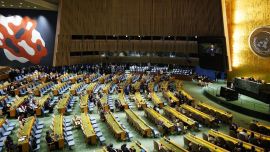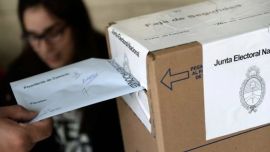With President Alberto Fernández essentially extending more of the same for the next three weeks on Friday, neither the present nor the immediate future offer any escape from the grim data of the coronavirus pandemic with a general retreat into the past in reaction. The president would dearly love to revert to being the highly popular “Captain Alberto” of last autumn when his leadership commanded almost blind obedience on the strength of a grand total of three Covid-19 deaths when quarantine was first declared. The opposition (at least in this city) has rallied around the defence of pre-Covid schooling when the digital revolution accelerated by this pandemic stands to sweep education into wholly new virtual dimensions (light years beyond the substandard Zoom classes offered in the past year), dissolving the traditional concept of school age with learning beginning pre-kindergarten and continuing into an advanced age in order to stay competitive in a changing world.
Reducing President Fernández to any single stance is always going to be simplistic and the almost impossible dream of reviving “Captain Alberto” comes with some new twists this year. Last autumn he began his quixotic battle against the virus as a knight in shining armour with two loyal squires at his side – Buenos Aires Province Governor Axel Kicillof and City Mayor Horacio Rodríguez Larreta. This year he is taking decisions in apparently total solitude, directly contradicting many of his ministers when the current tighter crackdown was first announced in mid-April, but at the same time he is seeking to spread the responsibility and hence the potential blame – the strategy behind the highly federal tone of Friday’s announcements.
Predefined as an electoral year, 2021 has yet to take shape. The year is supposed to begin when the summer recess ends with the March 1 inauguration of Congress or Easter week at the latest but May Day is now behind us with everything in the air. Elections invariably point politics in a single direction, even if usually the wrong one, but this year even their dates are written in the sand. The ruling coalition had been pinning its hopes of midterm success (with two-thirds majorities in both houses of Congress according to some in its extremist wing) based on a tripod of mass vaccination, a rebounding economy and Peronist unity but the pandemic has confounded all these props except perhaps the last.
The problem with vaccination is not only the alarming contrast between the trickle of deliveries from abroad and the daily flood of new coronavirus cases at home – the shortfalls in supply now run into the bar being raised for demand. The key here is the increasingly lower age of intensive care patients. Last year when the overwhelming majority of fatalities were past retirement age, the workers in essential activities did not belong to risk groups by definition (or were granted exceptional leave from the start of the pandemic if they did) and thus did not worry unduly. But now that nearly 60 percent of Covid-19 patients in intensive care wards are aged below 60, workers in transport, supermarkets and various other essential activities are demanding the same priority for vaccination so that the risk groups now threaten to mushroom beyond the original third or so of the population.
Despite the global commodity price boom, an economic rebound has lost its air of inevitability as the almost vertical spiral of coronavirus cases poses the danger of enforcing a lockdown which could make the second quarter of this year almost as recessive as the second quarter of last. This leaves Peronist unity as the main government card. Until now it has been axiomatic that a united Peronism will always win, no matter what the other circumstances, while a divided Peronism stands to lose (even if 1983 and 2003 were both exceptions to that rule) and that maxim alone makes sense of the otherwise seemingly absurd presidential ideological gymnastics to preserve his coalition. Yet this pandemic has devastated government credibility to such a degree that with its support down to a still appreciable third of the electorate, even a united front might not suffice. But on the other hand if those AstraZeneca vaccines first promised nine months ago finally come through along with millions of other doses, everything could change.
An absolute uncertainty which renders all electoral calculations pointless – even the most electorally obsessed politicians must resign themselves to “It’s the pandemic, stupid.”


















Comments